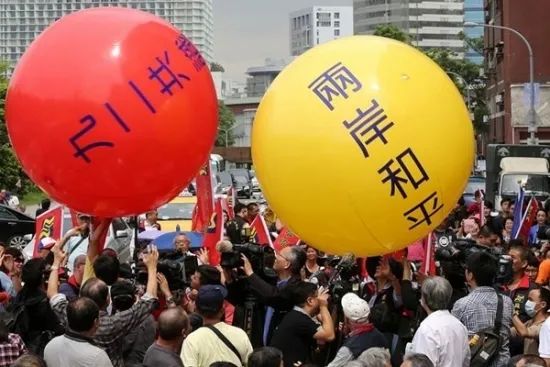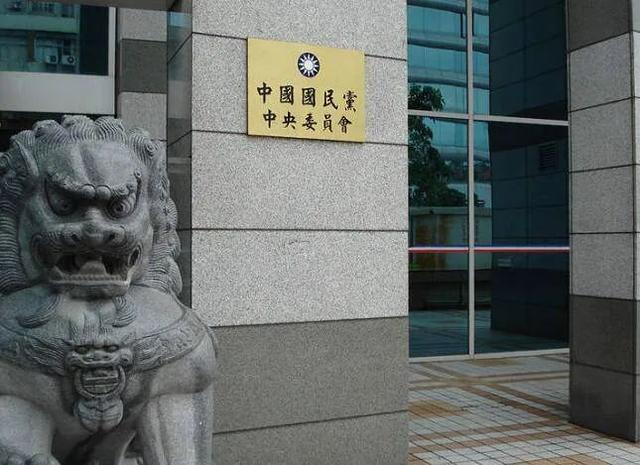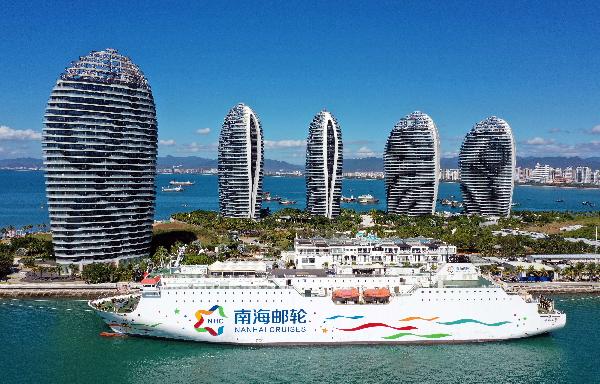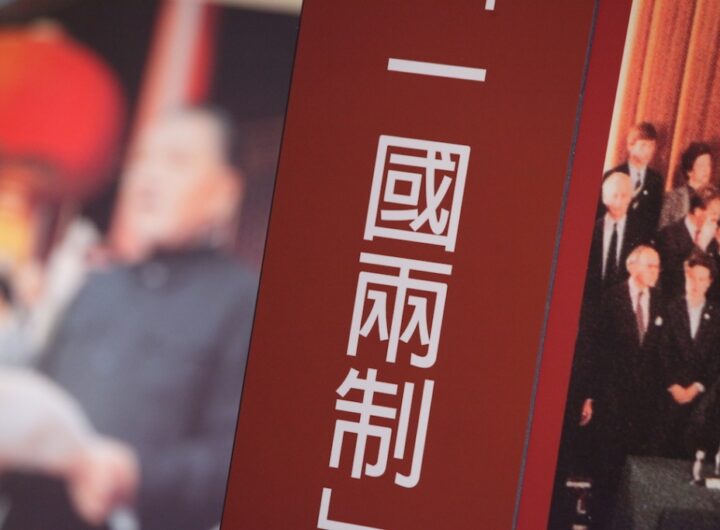
Pauline Ng, Jeffrey Wong, Sharleen Bian
2021-12-10
XIA Baolong, Vice Chairman of the National Committee of the Chinese People’s Political Consultative Conference and Director of the Hong Kong and Macao Affairs Office of the State Council, highlighted at a discussion forum themed “First Anniversary of Promulgating the Law of the People’s Republic of China on Safeguarding National Security in the Hong Kong Special Administrative Region: Reviews and Forecasts” held on 16th July 2021 the stabilizing effects of Hong Kong’s National Security Law on society. He also iterated how the Law marks a milestone in the implementation of “one country, two systems” in Hong Kong.
To perfect the electoral regime is the first step to materialize “Hong Kong people ruling Hong Kong” under “one country two systems”. Exercising a high degree of autonomy in Hong Kong after its return to the motherland was by no means an easy task, especially after British colonial rule of over 150 years, with the original systems and members of the then Administration being retained. The responsibility to lead the people of Hong Kong to adapt to the changes arising from the historic reunification falls on persons with strong patriotic convictions to join the Administration. They should safeguard China’s sovereignty, security, and territorial integrity by recognizing the constitutional relationship between the Central Authorities and the Hong Kong Special Administrative Region (“HKSAR”) to maintain Hong Kong’s prosperity and social stability. Only by doing so can the “one country, two systems” policy be implemented comprehensively and accurately in the HKSAR.
The Basic Law of the Hong Kong Special Administrative Region (“The Basic Law”) derives from the Constitution of the People’s Republic of China. The Constitution prescribes the fundamental system of the nation and stipulates that leadership by the Communist Party of China is the defining feature of the system. All citizens of China have the obligation to safeguard the honour, security and interests of the motherland, and to act in the favour of the nation’s long-term developments. Hong Kong citizens must recognise that “one country, two systems” is an integral part of the socialist system with Chinese characteristics practised in the motherland. By taking advantage of the HKSAR’s capitalist system which links with most developed jurisdictions in the world, Hong Kong citizens can help advance the far-reaching interests and people’s livelihoods of their motherland. The improvements brought to the electoral system serve to ensure that those who intend to join the Administration of HKSAR are fully aware of Hong Kong’s particular role in the nation’s overall strategy and only those who are qualified as patriots may run for office at the elections of the Election Committee, Legislative Council and Chief Executive.
In March 2021, the National People’s Congress (“NPC”) adopted the decision to improve the electoral system of HKSAR, under which the Election Committee should expand to include 1,500 members comprising ex-officio members, nominated members and elected members. The 2021 Election Committee Subsector Ordinary Elections were successfully held on 19 September. The 364 elected members, along with uncontested election candidates, ex-officio members, and nominated members, will form the new Election Committee. Their term of office spans from 22 October 2021 to 21 October 2026.
The Election Committee will carry out the responsibilities assigned to them by NPC’s decision. Committee members will nominate candidates for the office of the Chief Executive and elect the next Chief Executive. In addition, the Election Committee will nominate candidates for the Legislative Council and elect 40 of them to be Legislative Council members. Among the Election Committee members of the new term, quite a substantial number of them have little knowledge about the Election Committee or election work. While the authorities have taken steps to disseminate relevant information such as guidelines on preventing obstruction to fair election, Election Committee members would still need to consider certain objective criteria in determining whom they should nominate or support to become members of the Legislative Council or the Chief Executive.
Speaking at a forum themed “First Anniversary of Promulgating the Law of the People’s Republic of China on Safeguarding National Security in the Hong Kong Special Administrative Region: Reviews and Forecasts” on 16 July 2021, the Director of the State Council’s Hong Kong and Macau Affairs Office XIA Baolong points out that patriotism is the natural and necessary criterion for any election candidacy, but different patriots may possess different expertise and skills that enable them to play different roles in the community. However, if they are to become the administrators of HKSAR, they must possess the leadership and ethical qualities for administrative duties. XIA has particularly highlighted five expected qualities and the capabilities associated to these qualities: (i) Firm and unwavering stance on patriotism: capable of implementing the principles of “one country , two systems” fully and accurately in administering Hong Kong; (ii) Persistent and down-to-earth: capable of resolving conflicts and problems affecting Hong Kong’s development; (iii) Loyalty and commitment to people: capable of doing solid work for people; (iv) Charismatic leadership: capable of uniting and rallying support from all fronts; (v) Strong sense of responsibility: capable of performing the full duties of public offices. These qualities and capabilities of the persons who administer Hong Kong under the improved electoral system are expected not only by the Central Authorities, but also by the general public.
These qualities and capabilities of Hong Kong administrators are highlighted by XIA in the context of reiterating Hong Kong’s abilities to contribute to the revival of the Chinese nation. Hong Kong must be backed by the National Security Law, must fully implement the principle of “patriots administering Hong Kong” and make sure that only unwavering patriots with these qualities are elected to administer Hong Kong. These qualities are consistent with the standards laid down by President XI Jinping for public officers in the Mainland: “with unwavering political conviction; committed to serving the people; diligent and pragmatic; daring to shoulder responsibilities; uncorrupted and righteous”. This fully illustrates that patriots with determination to serve the country must possess the same absolute integrity and capabilities, no matter whether they are in the Mainland or in Hong Kong.
First of all, the administrators of Hong Kong should fully implement “one country, two systems” and support the central leadership’s exercise of the comprehensive jurisdiction over the Special Administrative Region. The Hong Kong administrators must make the best use of Hong Kong’s status as an independent economy within the “two systems” under “one country” in promoting China’s national economic strategy to foster both domestic and international circulations, by enhancing Hong Kong’s innovative strengths and research capacity to achieve self-sufficiency for continuous economic interdependence. At the same time, Hong Kong administrators should also make good use of the HKSAR’s capitalist infrastructures and long years of trading with well-established economies to make Hong Kong a window for attracting external capital investments and trades into China. Moreover, Hong Kong should remain alert to changes in international affairs and take advantage of the privileges given to it under the nation’s socialist system to implement the strategic policy for developing the Guangdong-Hong Kong-Macao Greater Bay Area and at the same time create opportunities for Hong Kong residents.
The recent promulgation of the Plan for Comprehensive Deepening Reform and Opening Up of the Qianhai Shenzhen-Hong Kong Modern Service Industry Cooperation Zone by the Central Authorities is another initiative to support Hong Kong’s socio-economic development. The Plan further elevates the level of cooperation between Guangdong, Hong Kong and Macao as a means to support Hong Kong’s socio-economic developments and formulate a new structure to open up China to the rest of the world. Hong Kong administrators should grasp all opportunities for strategic development to promote integration and linkage among the different regulatory frameworks and operational mechanisms under the “two systems”. This collaborative approach would make it possible to turn the Greater Bay Area into a lucrative platform for foreign investments and international cooperation, to provide new competition edge for the area, and at the same time create a greater sense of national identity for Hong Kong residents.
Hong Kong administrators must make all endeavours to serve the people. They should be ready to shoulder responsibilities and act responsibly, devoid of personal interests and totally committed to serving the community. When facing obstacles which affect people’s livelihoods and obstruct economic development, the administrators should be determined to confront the difficulties and take concrete steps to clear these hurdles. For a long time, Hong Kong has been troubled by quite a number of socio-economic problems, such as sky-high property prices, prolonged shortage of assisted housing, lack of synergy for the development of new industries, limited youth development opportunities, and insufficient community infrastructure for an ageing population. Coupled with deep-rooted conflict of vested interests and long-drawn political confrontation, inherent public discontent against the Administration has escalated significantly and posed a serious threat to regional safety and social stability. Hong Kong administrators must possess the charisma and ability to unite different stakeholders, address their varying needs and aspirations, and come up with solutions to solve these long-standing problems.
In handling opposition, administrators should have the patience and the heart to listen and accept different views so as to maintain an equilibrium among conflicting interests. Views coming from non-mainstream sources are equally important as they reflect the wishes of different sectors of the community which should be duly recognized. To achieve this objective, administrators cannot work alone; instead, they must work as a team. They must be able to deploy the right people who can exercise their influence and utilize their expertise to unite the efforts of the patriots in different sectors and geographic regions.
Administrators must always stay close to the general public to ensure that public policies genuinely address the needs and aspirations of the people, and that everything done is for the people. As heads of the Administration and members of the supporting team, administrators must have a strong sense of responsibility and the determination to confront all challenges regardless of their difficulty or complexity. They have the obligation to create a fair social environment so that people from all social classes can have equal opportunity to benefit from economic growth and the grassroots may enjoy upward mobility. People wish to see a government which truly looks after them. Everyone has a clear mind and understands teething problems. Concrete and prompt actions of the administrators to solve problems will enhance people’s trust in the government, and similarly, strengthen their recognition of the Central Authorities.
Applicability of patriotic spirit and administrative attributes
The determination to implement the principle of “patriots administering Hong Kong” is absolutely clear. The administrators of Hong Kong must swear allegiance to the HKSAR of the People’s Republic of China, and fully support the Basic Law of HKSAR and “one country, two systems”. The National Security Law promulgated on 30 June 2020 requires that Hong Kong residents running for or holding public offices must sign documents to declare that they uphold the Basic Law and bear allegiance to HKSAR. The HKSAR Government also provides in the Interpretation and General Clauses Ordinance of the Hong Kong legislation (Cap 1) a “positive list” and a “negative list” to specify the behaviors that can be categorized as displaying patriotism and those unfitting for a patriot respectively. Under the Improving Electoral System (Consolidated Amendments) Ordinance 2021, the Candidate Eligibility Review Committee (CERC) has been established to scrutinize the patriotic requirements for candidates in elections. In August 2021, when the CERC scrutinized the eligibility of candidates standing for election of the Election Committee, it referred to the “negative list” to assess the behaviours and publications of the candidates, and considered the candidates’ eligibility based on the “one election, one screening” principle, i.e. each screening is conducted independently based on its own circumstances.
The expected qualities and capabilities of Hong Kong administrators mentioned by XIA, together with the expected behaviours of patriots on the positive list of Cap 1, are in fact applicable to all persons holding public offices. As a matter of fact, it is a must for all public servants to be loyal to the country and the place they serve. The Chief Executive and his team cannot formulate and implement public policies which will benefit Hong Kong and its residents without the cooperation and undivided support from its civil service. There is no question about the requirement to pledge allegiance to the Special Administrative Region for staff working in the public service. Apart from the Chief Executive, members of the Executive Council and all principal officers, those who work in the Administrative Service, professional and departmental grades as well as those in the general grades should also bear the same mind in serving the public. It is only when the younger generation of various grades and ranks in the 190,000-strong civil service develop a sense of national identity and are given the opportunity to develop their professional and management skills that Hong Kong can pave the way for grooming political talents to form a reliable and high-quality civil service assisting the work of the Chief Executive.
One of the ultimate goals for stepping into politics is to become part of the Administration. Since reunification, a lot of those who are active in public service have been appointed to different government boards and committees. This is an effective avenue to enable these persons to have a better understanding of public administration. One matter which requires more thought is whether these persons, especially those who are appointed to policy-related statutory bodies or important policy consultative committees are in fact persons holding public offices mentioned by XIA. Notwithstanding that some of the committees require a certain degree of flexibility or overseas expertise due to the special nature of their work or other circumstances, there may be a need to consider in the course of selecting the candidates whether these persons satisfy the patriotic requirement and the qualities and capabilities required for taking up the positions. There may be a need to review the current appointment mechanism. Those who are responsible for selecting and determining the appointments should not be confined to civil servants. There should be room for self-nomination and nomination by the relevant trades and industries to ensure that different views can be channeled to these bodies. This also presents a good chance to expose patriots to challenges so as to prepare them for greater responsibilities. With more grassroot organisations included in the Election Committee, more people interested in public administration are able to gain exposure through this platform, hence strengthening the general public’s confidence in “patriots administering Hong Kong”.
The legislature is an integral part of the administrative structure of HKSAR. Similar to the executive authorities, the powers and functions of the legislature are clearly stipulated in the Basic Law, with each performing its own roles, providing mutual check and balance, yet coordinating each other’s functions. Nevertheless, long years of persistent filibustering in the legislature since 2012 and the almost total cessation of Council business for over half a year in 2020 have severely upset the administration of the Special Administrative Region. Public works programmes almost came to a complete halt; initiatives to improve people’s livelihoods, to fight the virus, and to promote economic growth, could hardly proceed. Members of the Legislative Council, who perform the duties of the legislature laid down in the Basic Law, are naturally public officers. When members of the Election Committee consider nominating or electing any person to become legislators, they should also give regard to the qualities and capabilities of administrators pointed out by XIA. In view of the importance of the work of the legislature, those who work in the Legislative Council Secretariat and in Members’ Offices should follow the example of civil servants in declaring that they will uphold the Basic Law.
Hong Kong is in urgent need of administrators who have good understanding of “one country, two systems”, have the determination and capabilities to tackle the pressing issues affecting the community, and have the charisma to unite people for their common good. The newly elected members of the Election Committee will soon be participating in the election of the Seventh Legislative Council and the sixth term of Chief Executive. It is right time for them to consider carefully the qualities and capacities mentioned by XIA when electing the right persons to fill these positions.
Recommendations
(A) The organisations representing the Central Authorities in Hong Kong, with the assistance of the Principal Convenor of the Committee, should organize briefing sessions to facilitate members of the Election Committee to have better understanding of their duties and responsibilities, the operation of the Committee, the role of the Convenors, and nomination and election procedures;
(B) The convenors of the Election Committee may organise thematic seminars and invite local and Mainland experts to analyse national development situation, international politics and global economic environment, with a view to exploring Hong Kong’s role in the national development plan of our country;
(C) The convenors of the Election Committee may also organize seminars on specific policies and invite experts to analyse the issues that have been affecting the people of Hong Kong, the effectiveness of the policies and possible solutions;
(D) The Hong Kong Government ought to organise briefing sessions on how the Government and the Legislature carry out their work and how they relate to each other. Members of the Election Committee should also be reminded of the legislative framework governing elections and the procedure in nominating and electing candidates, so as to avoid any breach of law.
Conclusion
In the 40 years since the 1980s, drastic changes have taken place in the international environment. It was during this period that our country has gone through significant growth to become the world’s second largest economy and the largest trading country in the world. Even the self-protection and isolation policy adopted by most countries during the COVID-19 period has not affected our country’s determination to bring about rejuvenation of the Chinese nation. In the case of Hong Kong, the “one country, two systems” principle has continued to evolve, with a view to bringing better living for people by integrating the capitalist and socialist systems to suit the ever-changing needs of our country. Hong Kong administrators should not be content with the status quo. They should strive to understand our nation’s policy direction in this new era, grasp the opportunities arising from the rapid global changes, utilize Hong Kong’s strengths and potentials, and unite the forces within the Region for upholding national dignity and development interest and creating a new environment for achieving national rejuvenation.






